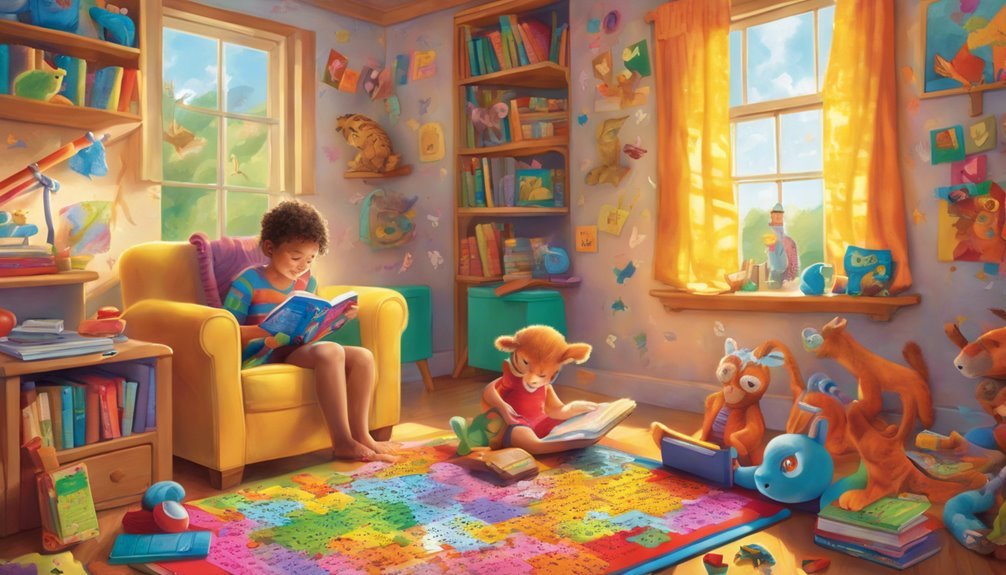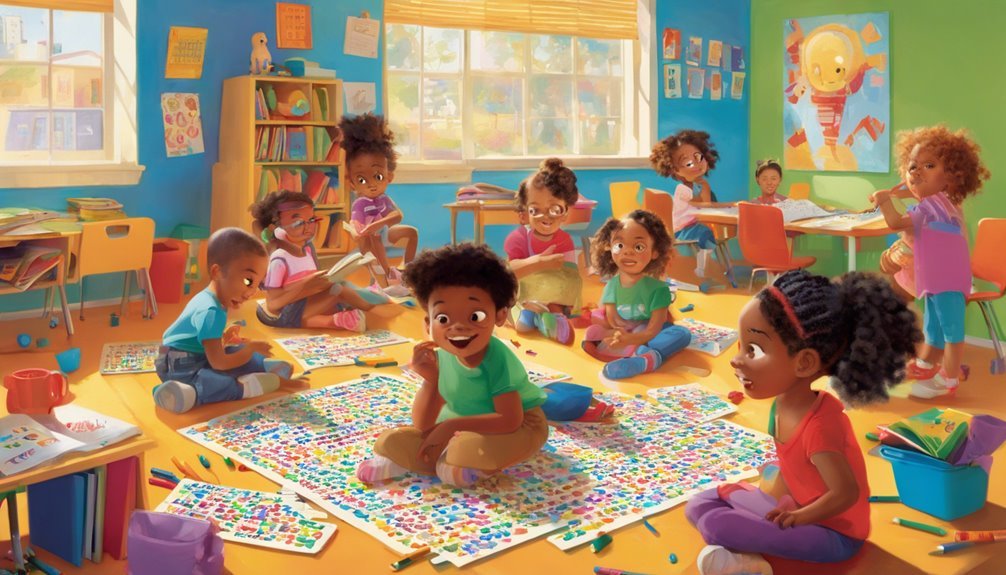Word Search Puzzles for Preschoolers: A Great Pre-Reading Activity
Did you know that engaging preschoolers in word search puzzles can significantly boost their early literacy skills? These fun activities not only enhance vocabulary but also promote essential letter recognition. As your child navigates through the puzzles, they're developing a love for language in a playful way. Curious about how to introduce these puzzles effectively? Let's explore the benefits and methods that can transform learning into an enjoyable adventure for your little one.
Key Takeaways
- Word search puzzles enhance vocabulary by exposing preschoolers to new and familiar words in an engaging format.
- These activities boost letter recognition through playful interactions, helping children identify letters effectively.
- Completing word searches fosters pattern recognition, critical for cognitive development and future learning.
- Thematic word searches tied to stories increase interest and connection with reading material.
- Collaborative puzzle-solving promotes teamwork and social skills, making learning a fun group activity.
The Importance of Word Recognition in Early Literacy
While you may not realize it, word recognition is a crucial stepping stone in your preschooler's journey to literacy. By fostering word familiarity through early exposure, you set the stage for successful reading skills.
When children recognize words quickly, their confidence grows, making reading a more enjoyable experience. You can enhance this skill by introducing simple and familiar words during playtime or everyday conversations.
Encourage your child to interact with books, pointing out and naming objects they see. This practice helps them connect words with meanings, solidifying their understanding.
How Word Search Puzzles Enhance Vocabulary Skills
Word search puzzles aren't just a fun way to pass the time; they're powerful tools for boosting your preschooler's vocabulary skills. As your child searches for words, they're actively engaging in vocabulary building.
This activity exposes them to new terms and reinforces familiar ones, enhancing their language exposure. Each word discovered can spark curiosity, leading to discussions about meanings and uses in everyday life.
You'll notice how they start to connect words with images or concepts, creating a richer understanding of language. Plus, the thrill of finding words encourages persistence and focus, essential traits for learning.
Developing Letter Identification Through Fun Activities

As your preschooler dives into engaging activities, they'll naturally develop letter identification skills that are crucial for reading and writing. Incorporating fun letter games into their daily routine can make this learning process enjoyable.
Try activities like scavenger hunts, where they search for objects starting with specific letters, or create colorful flashcards for interactive play. These preschool activities not only enhance their recognition of letters but also foster a love for learning.
Singing the alphabet song or reading together can further reinforce these skills. Remember, the more playful you make it, the more your child will be motivated to learn.
Encouraging Pattern Recognition With Puzzles
Encouraging your preschooler to recognize patterns can be both fun and educational, especially when you incorporate puzzles into their playtime.
Pattern recognition is crucial for cognitive development and lays the groundwork for later learning, including math and reading skills.
Here are some engaging ways to use puzzles for this purpose:
- Choose puzzles with repeating colors or shapes.
- Create simple sequences for your child to complete.
- Use word search puzzles to identify letter patterns.
- Encourage them to find objects that match in different puzzles.
- Celebrate their successes to boost confidence.
Tips for Introducing Word Search Puzzles to Preschoolers

Introducing word search puzzles to preschoolers can be a delightful way to build on their pattern recognition skills while sparking their curiosity about letters and words.
Start with engaging themes that resonate with your child's interests, like animals or colors. Choose simple puzzle variations, such as those with fewer words or larger print, to avoid overwhelming them.
You can even create custom puzzles featuring family names or favorite toys. As you work together, encourage them to point out letters and celebrate their discoveries.
Keep the atmosphere light and fun, turning it into a game rather than a task. With your support, they'll gain confidence in their reading skills while enjoying the process of learning through puzzles.
Making Learning Enjoyable: Creative Approaches to Word Searches
While word searches can seem straightforward, there are countless creative ways to make them engaging and enjoyable for preschoolers. By incorporating elements of playful learning, you foster creative engagement that keeps them excited about reading.
Here are some ideas to consider:
- Thematic Searches: Create puzzles based on their favorite stories or topics.
- Colorful Clues: Use pictures or colors to help them identify words.
- Interactive Storytelling: Incorporate word searches into storytime as a fun activity.
- Outdoor Word Hunts: Hide words around the yard for them to find and collect.
- Collaborative Play: Encourage teamwork by having them solve puzzles together.
These approaches not only enhance their word search experience but also build foundational skills in an enjoyable way!
Frequently Asked Questions
What Age Is Appropriate for Introducing Word Search Puzzles?
You can introduce word search puzzles around age 4 to 6, as this aligns well with children's cognitive development and early literacy skills.
At this age, kids start recognizing letters and words, making it a fun way to strengthen their learning.
These puzzles encourage critical thinking and problem-solving, boosting their confidence as they find words.
It's a delightful way to engage them in reading while keeping the activity enjoyable and age-appropriate!
How Long Should a Word Search Session Last for Preschoolers?
You might think that word search sessions can be lengthy, but that's not the case for preschoolers. Their attention span typically allows for just 10 to 15 minutes of focused activity.
Keeping your sessions short not only prevents frustration but also keeps their interest piqued. Break the puzzles into smaller segments, and you'll see how effective and enjoyable these sessions can be, setting the stage for a love of learning!
Are There Specific Themes for Preschooler-Friendly Word Searches?
Absolutely! When choosing themes for preschooler-friendly word searches, consider animal themes and seasonal themes. Kids love exploring the animal kingdom, so using words like "dog," "cat," and "elephant" makes it fun.
Seasonal themes, like "summer," "fall," or "winter," help children connect with the world around them. You can create engaging, age-appropriate puzzles that spark their interest and enhance their vocabulary.
Themed word searches can be both educational and entertaining!
Can Word Searches Be Adapted for Different Learning Styles?
Absolutely, you can adapt word searches for different learning styles!
For visual learners, use colorful images alongside words. Auditory learners might benefit from discussing words out loud.
Incorporate kinesthetic activities by having kids physically find words in a larger space. To enhance tactile engagement, consider using textured letters or materials.
How Do I Create My Own Word Search Puzzles for Children?
Creating your own word search puzzles for children is a fun challenge! Start by choosing a theme, like animals or colors.
Next, list relevant words and decide on word search strategies, such as horizontal, vertical, or diagonal placements.
Use a grid to arrange the letters and hide the words.
Finally, test your puzzle for difficulty and clarity. With practice, your puzzle creation skills will shine, making learning enjoyable for kids!
Conclusion
Incorporating word search puzzles into your preschooler's routine is like planting seeds in a vibrant garden of language. As they gleefully hunt for words, their vocabulary blossoms, and letter recognition flourishes under the warm sun of curiosity. By making learning playful, you're not just nurturing their minds; you're also igniting a lifelong love for reading. So, grab those puzzles, and watch as your little one embarks on an exciting adventure through the enchanting world of words!







